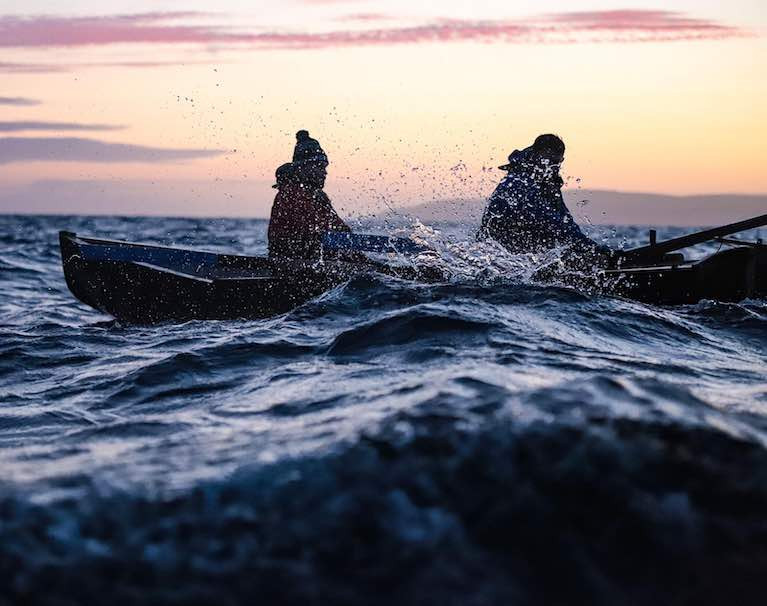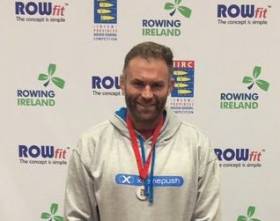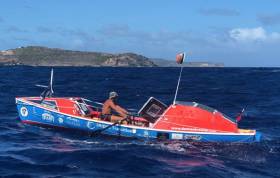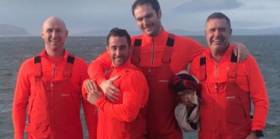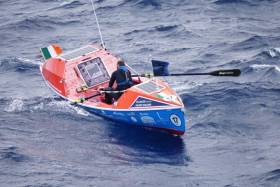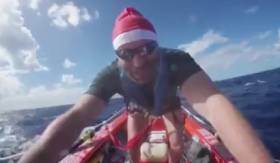Displaying items by tag: Damian Browne
Former rugby player Fergus “Gussie” Farrell who was medically evacuated from rowing vessel Cushlamachree 600 nautical miles out in the Atlantic late last month has said he is gutted at having had to leave his rowing partner Damian Browne.
Speaking on RTÉ Seascapes on Friday, Farrell has also paid tribute to the master and crew of the Singapore flagged tanker, Hafnia Shenzhen, which responded to a US Coast Guard request for assistance.
The tanker diverted, and Farrell was brought on board using the gangplank, and taken to the medical room for further assessment.
Farrell’s oxygen levels had dropped to 86 per cent on June 26th, and he was at risk of blood clots.
He described on Seascapes how his online medical support took just 30 seconds to assess the information and inform him his row was “finished”.
The pair were 13 days out from New York on an unsupported row to Galway, and were attempting to set a new Guinness world record in their purpose-built Seasabre 6.2m craft.
 Fergus Farrell prepares to leave Cushlamachree and board the tanker Hafnia Shenzhen Photo: via Facebook
Fergus Farrell prepares to leave Cushlamachree and board the tanker Hafnia Shenzhen Photo: via Facebook
Farrell survived a traumatic spinal injury in 2018, learned to walk again and walked across Ireland to raise funds for the National Rehabilitation Hospital of Ireland Foundation in 2019.
The Hafnia Shenzhen took him to New York where he was taken to hospital for further tests and cleared to fly back to Ireland.
Browne is continuing the row solo to Galway as part of Project Empower, in aid of four charities, and has three oars left after he capsized three times.
Speaking on a Linked In post while on para-anchor for 17 hours, Browne said he had “no interest in capsizing again” but was a “sitting duck” in huge waves.
 The position of rowing vessel Cushlamachree on July 17 with Damian Browne onboard
The position of rowing vessel Cushlamachree on July 17 with Damian Browne onboard
He said the boat was “decimated”, with the ocean ripping away oars and he nearly lost his seat.
He lost items including a -jet boil, ten-litre drinking container and compass.
He said it was the first time that he was “a little bit scared for expedition’s success”, with so much water in the cabin after the capsizes.
These are “very very very long hours”, he said, and the lyrics of a Johnny Cash song kept coming into his head – as in "Son, this world is rough, And if a man's gonna make it, he's gotta be tough"
“We’ll see how we go,” Browne said.
Listen to Fergus Farrell’s interview on Seascapes here
Galway adventurer Damian Browne’s transatlantic rowing partner Fergus Farrell has been referred for tests to a New York hospital after he was forced to leave their vessel, Cushlamachree, after almost 13 days at sea.
The pair had set off from New York in mid-June on an unsupported row to Galway, and were attempting to set a new Guinness world record in their purpose-built Seasabre 6.2m craft.
In a statement from MacDara Hosty on Project Empower’s Facebook page, he said it was with “huge regret” that Farrell had to depart on Sunday, June 26th at 4.45 pm, Irish time.
“Fergus is now doing well, has arrived back in New York, and is awaiting transfer to a hospital in New York where he will undergo tests,” the statement said.
“Chris Martin, who is operating as on-call land support officer for the team, was called by Fergus on Sunday, June 26th at 1 pm Irish time,” it said.
“Fergus had been experiencing severe exhaustion, and despite lots of rest was failing to recover,” it said. In 2018, Farrell experienced a traumatic spinal injury, was paralysed but learned to walk again the following year against all odds.
The statement said that Fergus “had started to experience tightness on the left side of his chest and had a very low blood oxygen percentage”.
“After consultation with our medical consultants and the United States Coast Guard (USCG) flight surgeon, it was decided that Fergus should be extracted with all possible speed.”
Weather conditions in the area were “benign”, with light winds and small swells of around a metre, and by 15.58 Irish time, the Singapore flagged tanker, Hafnia Shenzhen, had responded to a USCG request for assistance. The tanker diverted, and Farrell was brought on board using the gang plank, and taken to the medical room for further assessment.
“Fergus responded well to initial treatment on board the Hafnia Shenzhen, and the decision was made not to airlift him by USCG or Navy helicopter to hospital, electing instead for him to remain onboard the Hafnia Shenzhen until she docked in New York,”the statement said.
Paul Cleary, a friend of Project Empower in New York, arranged to transfer Farrell to hospital for tests and a full assessment.
“Fergus is hugely disappointed at having to leave Cushlamachree, but understands that his and Damian’s health and safety has, and always will be, the primary concern for Project Empower,”the statement said.
It said Damian Browne has chosen to stay with Cushlamachree, and would row the vessel solo to Galway over the coming weeks. Browne previously rowed the Atlantic solo from the Canary islands to Antigua.
“Project Empower wasn’t planned this way, and none of us wanted it to be this way,”it said. “Gussy and Damian were supposed to do this together and row into Galway docks together. We are all absolutely gutted that they won’t now get to complete it together,” it said.
The project expressed thanks to the staff at USCG District 1 rescue co-ordination centre, USCG sector New York, and Capt Sanjay Karki and crew of the Hafnia Shenzhen for their “rapid response, expertise and kindness in dealing with this situation as professionally and courteously as they did”.
It has been estimated that it will take 1.5 million oar strokes to complete the 5,000 km crossing. The pair nominated four charities to benefit from the row– Ability West, the Galway Simon Community, Madra animal rescue and the National Rehabilitation Hospital (NRH) foundation.
Browne is well familiar with what is ahead, having spent 63 days 6 hours and 25 minutes at sea completing the Talisker Whiskey Atlantic Challenge to Antigua in 2017-18.
The existing world record for an unsupported row was set over 120 years ago by Norwegians George Harboe and Frank (Gabriel) Samuelsen who were the first pair to attempt it.
Browne, who spent 16 years on the rugby pitches of the Celtic League, English Premiership and French Top 14 Championship and was part of the winning 2012/13 Heineken Cup team with Leinster Rugby, has climbed in the high altitude Pamir mountains in Afghanistan.
He has summited Kilimanjaro in Tanzania, Mont Blanc in France and Gran Paradiso in Italy.
After retiring from rugby, he completed the six-day, 257 km Marathon des Sables in the Sahara desert, also known as the “toughest footrace on Earth”. He then spent 18 months preparing for his solo row across the Atlantic.
At sea, he endured nine-metre swells, a badly cut head, capsizes, encounters with whales, sea and pressure sores, lost an oar and experienced complete steering failure with still over 2000 nautical miles to go to Antigua.
Fergus Farrell is a lifelong friend of Browne’s. Both played underage rugby together for Connacht and Farrell was a self-employed businessman who experienced a traumatic spinal injury.
On October 26th 2018, Farrell ruptured his T9, T10 and T11 spinal discs in the middle of his back. One of the ruptured discs leaked into his spinal cord. After an operation in the National Spinal Unit at the Mater Hospital, Farrell says he noticed his motionless feet and asked his surgeon if this is how he would be for the rest of his life?
He says the surgeon put his hand on Fergus’s shoulder and “calmly told him he had been extremely unlucky”.
Farrell, who was then paralysed from the waist down, moved to the NRH and set about his recovery.
On October 26th 2019, a year after his surgery, he miraculously completed a 206km walk from the site of the injury at his yard in Athenry, Galway to the NRH in Dún Laoghaire.
Farrell attributes his recovery to his “stubbornness, thickness and determination”, and he also raised €70,000 for the NRH.
Farrell has said he is determined to give his second chance of life everything he can give. He has said he wants to show people that “the mind is a positive and powerful part of everybody’s lives” and that “when challenged correctly there are no limits to what you can achieve”.
Browne’s continued progress can be tracked on their website here Listen into Lorna Siggins 2020 podcast with the pair here
Atlantic Rowers Set Sights on Guinness World Record - Podcast
Former professional rugby player and Galway adventurer Damian Browne and his lifelong friend and fellow rugby player Fergus Farrell are attempting to set a new Guinness world record in an unsupported row across the Atlantic in two years’ time.
It won’t be a currach, but it will be in a craft which they have to steer themselves. Browne has done this before, having rowed solo across the Atlantic and has also climbed five of the world’s seven highest summits. Farrell has had his own tough taste of endurance, having learned to walk again - and then walking across the country - after a serious workplace accident two years ago.
As regular Afloat readers will recall, the two men rowed a currach from the Aran island of Inis Oírr to Galway city in September to highlight their bid to cross the Atlantic in 2022.
Lorna Siggins spoke to them both for Wavelengths, the podcast of news and views from the Irish coast for Afloat below.
Byrne Sets Junior Record at Provinces Indoor Rowing
#Rowing: Ocean rower Damian Browne and junior rowers Alex Byrne and Caoimhe O’Sullivan were amongst the record breakers at the Provinces Indoor Rowing Championships in the University of Limerick on Saturday.
Shandon rower Byrne hit six minutes and five seconds for the 2,000 metres category, while O’Sullivan of Muckross covered 1,000 metres in three minutes 44.6 seconds.
Browne, a former professional rugby player who completed his row across the Atlantic earlier this year, took and beat the old record for 500 metres. He set a new time of one minute 16 seconds.
Records set at the Provinces Indoor Rowing Championships, University of Limerick, Saturday:
Men – Open 500m: Damian Browne 1 min 16 sec. Lightweight, Open 500m: Aidan Greene, Kincasslagh RC 1:28.7. Jun 18, 2,000m: Alex Byrne, Shandon RC 1:28.7.
Women – Lightweight Open 500m: Niamh Doogan, Kincasslagh RC 1:45.1. Jun 16 1,000m: Caoimhe O’Sullivan, Muckross.
Atlantic Rower Damian Browne Arrives in Antigua to Big Welcome
#Rowing: Damian Browne has completed the Atlantic Challenge Rowing race. The big Galway man, a former professional rugby player, took 63 days to row from the Canary Islands to Antigua. He suffered through storms and capsizes and posted Facebook videos which showed the injuries he suffered. Rowing as Gulliver’s Travels, he was the final boat of the race to finish. He was greeted by a big group of green-clad Irish fans on land.
Northern Irish Crew On Track in Atlantic Rowing Race
#Rowing: Home to Portrush and Relentless, from Cork and Dublin, look set to finish the Atlantic Challenge race in under a week. The Northern Irish crew has taken a clear fifth place and are putting in good mileage each day – they covered 88 nautical miles (163 kilometres) moving into the 27th day of the race from the Canary Islands to Antigua. The crew of George McAlpin, Ally Cooper, Gareth Barton and Luke Baker had 459 nautical miles (850 km) to the finish.
One place behind them lie another four, Relentless. The Cork/Dublin crew have also benefitted from the favourable winds. If they continue their fine progress they will land in English Harbour in Antigua just one day after Home to Portrush, on January 15th.
Solo oarsman Damian Browne has crossed the 1,000 nautical mile mark and has been punching in very steady times after coming through capsizes, an injured face and a damaged steering system. The Galway man, who rows as Gullivers Travels, is projected to finish on Valentine’s Day, February 14th.
Battling Browne Back on Track in Atlantic Row
#Rowing: Damian Browne is back on track in the Atlantic Challenge rowing race. The solo oarsman covered 36 nautical miles (67 km) in the 24 hours to midday on Saturday and heads into the third week of the race from the Canaries to Antigua with a good chance of bettering his 20th place by overtaking some of the pairs. Browne, who competes as Gullivers Travels, was hurt during a set of capsizes just after Christmas but vowed to race on.
Near the head of the 21 boats which are still in the race, Relentless, from Cork and Dublin, and Home to Portrush have swapped places. Both are fours. The Northern Ireland crew covered a remarkable 74 nautical miles (137 km) in the day to midday Saturday and took over in fifth from Relentless, which has taken a more southerly route. The leading crew is the Four Oarsmen, with Team Antigua third. Solo oarsman Mark Slats in Row for Cancer holds on to third. Swiss Mocean, which is also taking a southerly course, lies fourth.
Browne 'Bloodied but Unbowed' after Capsize
#Rowing: Damian Browne twice capsized and suffered facial injuries but has continued to row in the Atlantic Challenge race. The Galway man, who competes as Gullivers Travels, posted a remarkable video on his Facebook page below telling of how he had been woken by his face “getting smashed off the side of the cabin”. He made light of the cut, which bled profusely, and the other injuries. The hours following brought another capsize and sighting of a whale which circled his boat and made eye contact with him. Browne and the two other boats from Ireland in the race, Relentless and Home to Portrush, are two weeks into the race from the Canary Islands to Antigua.
Christmas Cheer for Irish Atlantic Rowers
#Rowing: Christmas has been productive for the Relentless and Gullivers Travel crews taking part in the Atlantic Challenge rowing race. The four-man Relentless crew covered 84 nautical miles (156 kilometres) in the 24 hours to 4pm on St Stephen’s Day. They had rowed 993 nautical miles, and are set to pass the psychologically important 1,000 nautical-mile staging post today. They stand fourth of the fours and fifth overall.
Damian Browne, the solo oarsman who rows as Gullivers Travels, posted a Facebook message on Christmas Day. After tricky times early in the race he has locked in a steady race rhythm. He is 17th of the 21 boats at sea in the race from the Canary Islands to Antigua. Two crews, Team O2 and Team Tenzing had to be rescued in recent days after capsizes. The race organisers report that all the rowers are well.
Home to Portrush, a four, stands seventh overall.
Irish On Track in Ocean Rowing Race
#Rowing: Irish boats are making progress in the Atlantic Rowing Race. Damian Browne, who was tested by difficult conditions and seasickness in the first two days, reported on his Facebook page that he has recovered. By 6pm on Monday he had rowed 154 nautical miles (285 kilometres) of the 2,700 nm/5,000 km journey from the Canary Islands to Antigua.
Relentless, the Cork/Dublin four, were making good speed closer to the head of the field. They were adjudged to be sixth overall. Home to Portrush, tracking further south, placed eighth.


























